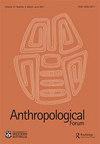COVID-19期间的研究想象:重新思考人类学和人类学邻近合作中的群体规模和作者规范
IF 0.7
3区 社会学
Q3 ANTHROPOLOGY
引用次数: 0
摘要
本文探讨了COVID-19大流行如何成为人类学家和其他社会科学家的集体关键事件,并研究了它如何促进了研究想象力的新配置。我们利用自己参与一个由17名研究人员组成的团队的经验,这些研究人员来自人类学和人类学相关学科,在大流行期间研究奥特阿瓦/新西兰的社会生活,研究我们自己的研究想象是如何在我们的合作过程中以及通过我们的合作过程转变的。当我们的项目刚开始时,我们中的许多人都对规范、偏见和焦虑产生了怀疑,这些在我们的学科中很常见:团队太大而无法有效运作,或者不可能开发出一种方法来确定作者身份,让每个人都觉得自己的贡献得到了充分的认可。在实践中,庞大的团队规模是一个关键的优势,使我们的团队有效地工作。作者身份的困难并不是来自小组内部,而是来自我们喜欢的工作方式与各种专业和出版机构对作者身份的想象方式之间的脱节。我们得出的结论是,大规模的合作有很多对他们有利的地方,而且资助者、期刊、大学和专业协会的研究想象力应该扩大,以确保他们得到鼓励、支持和充分的奖励。本文章由计算机程序翻译,如有差异,请以英文原文为准。
The Research Imagination During COVID-19: Rethinking Norms of Group Size and Authorship in Anthropological and Anthropology-Adjacent Collaborations
ABSTRACT This article explores some of the ways in which the COVID-19 pandemic has served as a collective critical event for anthropologists and other social scientists, examining how it has promoted new configurations of the research imagination. We draw on our own experiences of participating in a team of 17 researchers, hailing from anthropology and anthropology-adjacent disciplines, to research social life in Aotearoa/New Zealand during the pandemic, examining how our own research imaginations were transformed during, and via, the process of our collaboration. When our project first began, many of us had doubts reflective of norms, prejudices and anxieties that are common in our disciplines: that the group would be too large to function effectively, or that it would be impossible to develop an approach to authorship that would allow everyone to feel their contributions had been adequately recognised. In practice, the large group size was a key strength in allowing our group to work effectively. Difficulties with authorship did not arise from within the group but from disconnects between our preferred ways of working and the ways authorship was imagined within various professional and publishing bodies. We conclude that large-scale collaborations have many points in their favour, and that the research imaginations of funders, journals, universities and professional associations should be broadened to ensure that they are encouraged, supported and adequately rewarded.
求助全文
通过发布文献求助,成功后即可免费获取论文全文。
去求助
来源期刊

Anthropological Forum
ANTHROPOLOGY-
CiteScore
3.60
自引率
10.00%
发文量
14
期刊介绍:
Anthropological Forum is a journal of social anthropology and comparative sociology that was founded in 1963 and has a distinguished publication history. The journal provides a forum for both established and innovative approaches to anthropological research. A special section devoted to contributions on applied anthropology appears periodically. The editors are especially keen to publish new approaches based on ethnographic and theoretical work in the journal"s established areas of strength: Australian culture and society, Aboriginal Australia, Southeast Asia and the Pacific.
 求助内容:
求助内容: 应助结果提醒方式:
应助结果提醒方式:


